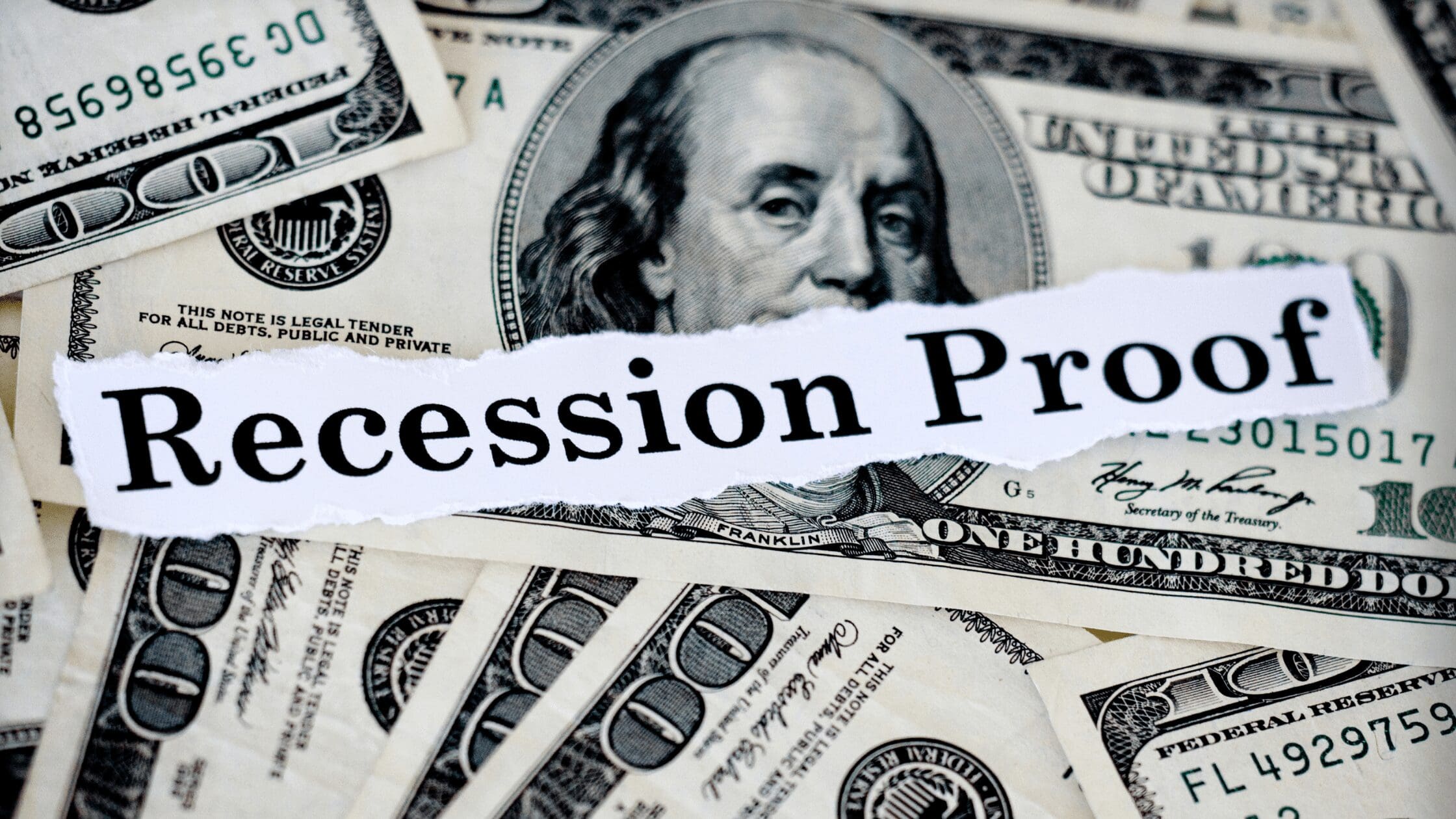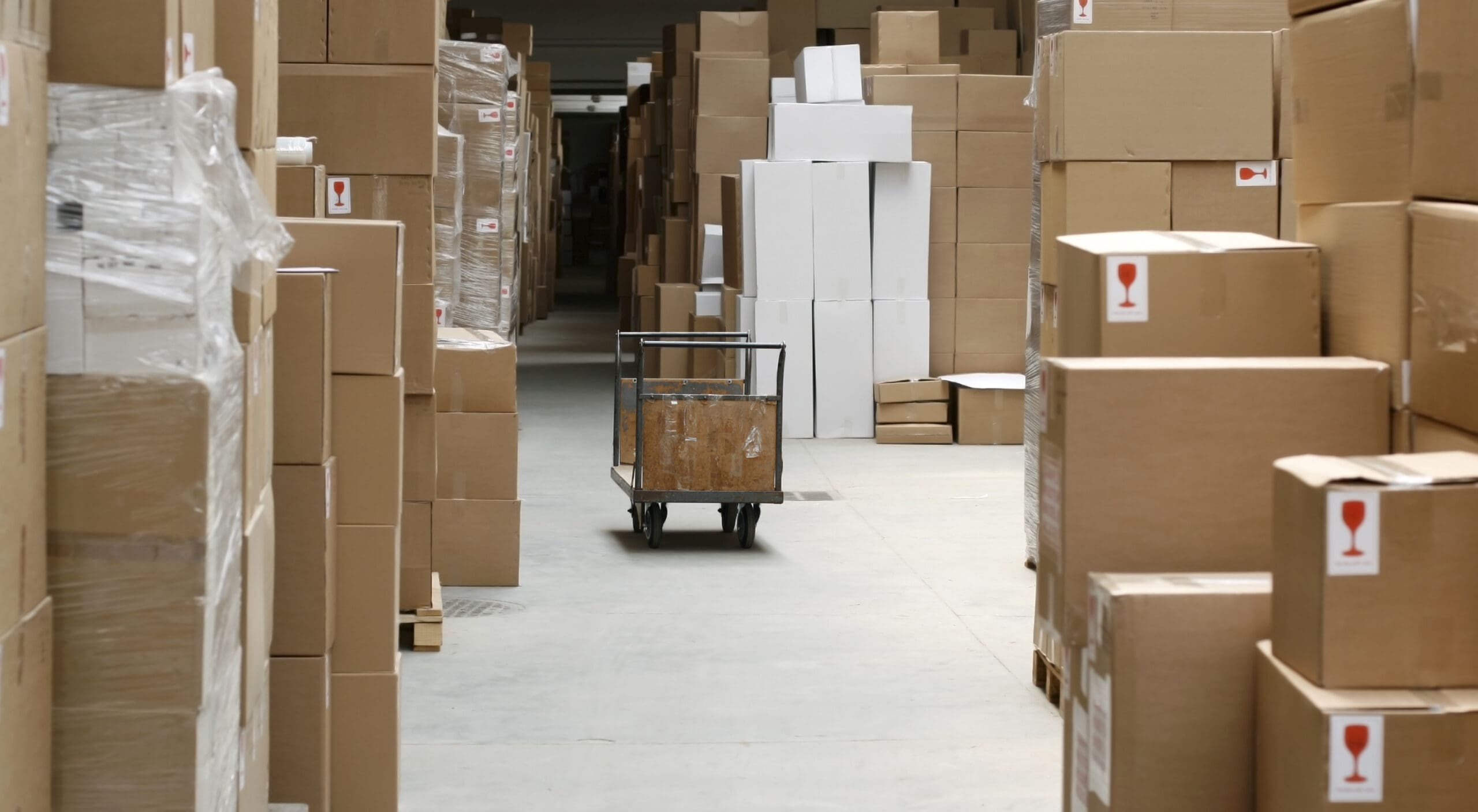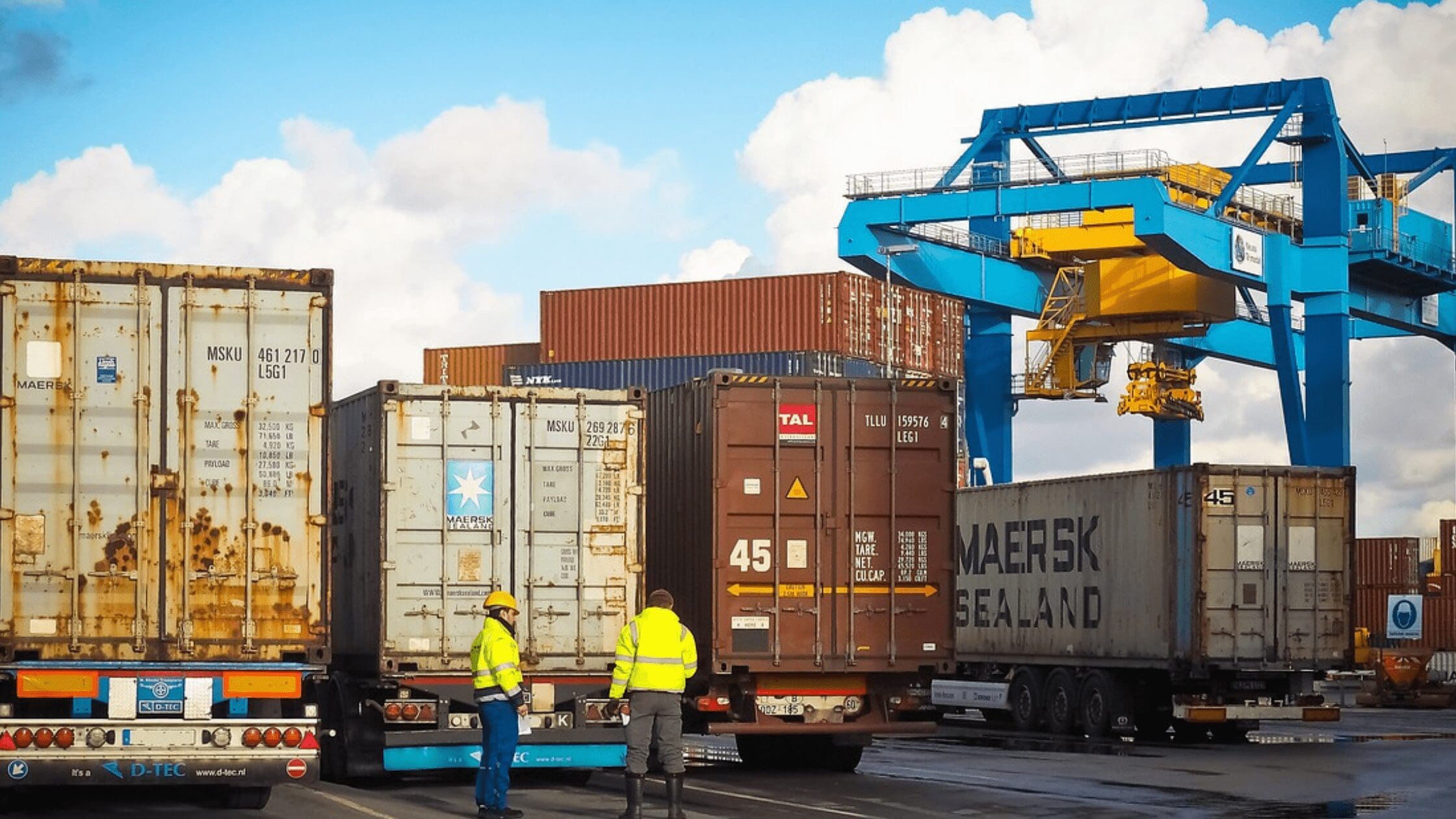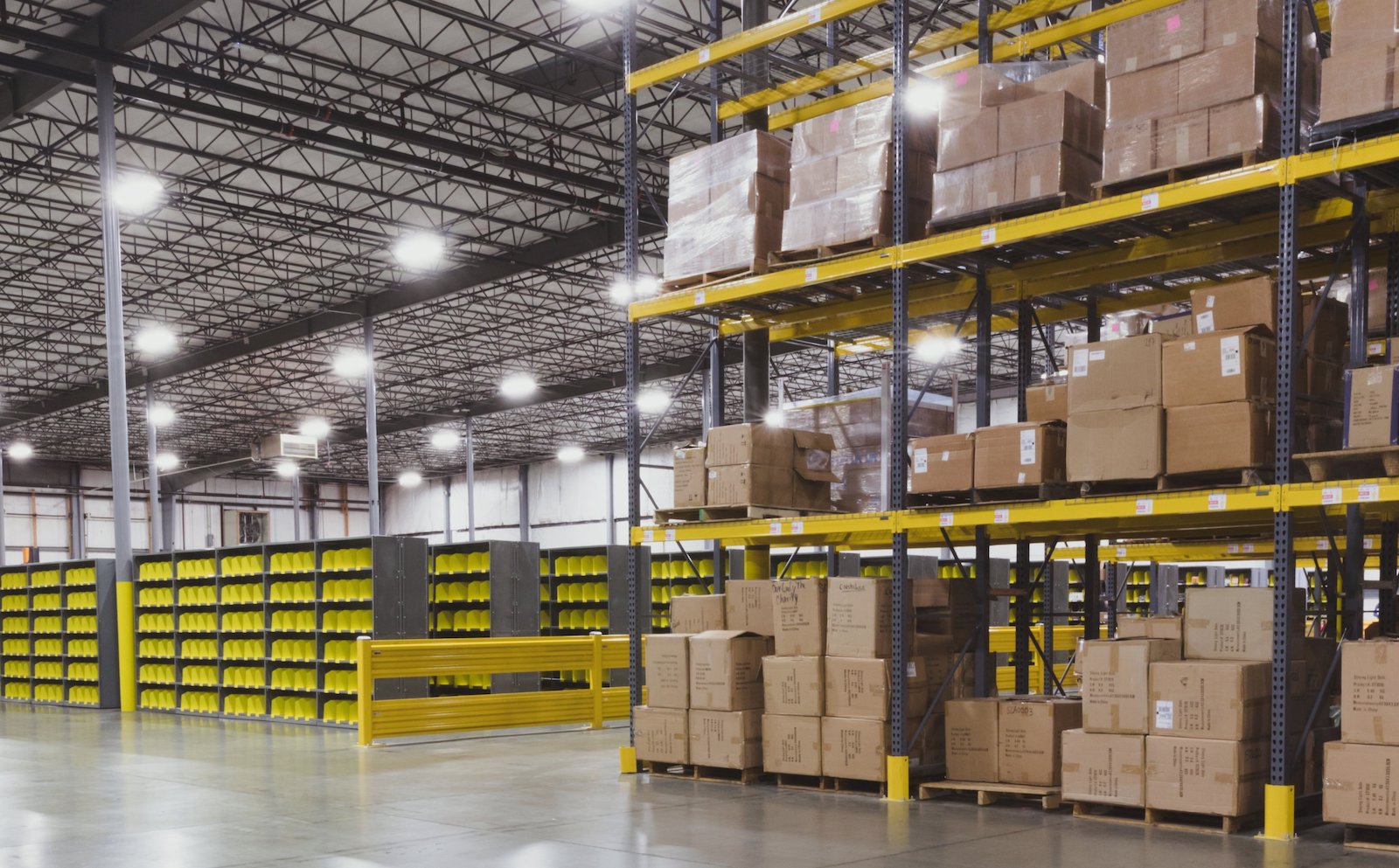Table of Contents
** Minutes
Existing recession-proof businesses post-COVID
8 best recession-proof businesses and industries
8 recession-proof product types in 2024
Business ideas for the future, even during a recession
Economic hard times are stressful for consumers and businesses alike. During times like these, consumers are pinching pennies and businesses are analising their bottom line and creating strategies for how to keep the literal or proverbial doors open.
In recent years, the global economy has been impacted by COVID-19, inflation, political unrest, supply chain challenges, and numerous other factors. Consumers and businesses may be wondering how they can prepare for the uncertainty of what comes next.
Some products are known to be recession-proof, including toiletries, health and first aid items, home goods, and groceries. Essential sectors like healthcare, grocers, household products, and fulfilment logistics are also seeing a rise in demand, as evidenced by the recent Coronavirus pandemic.
In this blog, we’ll explore these industries and what gives them appeal (or necessity) during times of economic downturn. Read on to learn how your brand can offer these “recession-proof” products to consumers.
Existing recession-proof businesses post-COVID
The ecommerce industry was seeing record growth at the beginning of the COVID-19 pandemic and as it went on, adoption increased. Now, ecommerce is at an all-time high and consumers are shopping online more now than ever before.

The graph above depicts the sharp increase in ecommerce penetration before and at the beginning of the COVID-19 pandemic.
The ability to sell online has allowed many businesses to stay afloat since they have a greater ability to get products into the hands of consumers when and where they need them.
What makes a product recession-proof?
Recession-proof products are items that are items that continue to experience demand, despite economic downturn. Past recessions have shown that consumer staples and necessary items that are used regularly are the most recession-proof products.
Inelastic demand
Some products have been deemed essential and meet our basic physiological needs. Products like toilet paper, food, and cleaning supplies during this time are going to be in high demand, even if the price increases. But that doesn’t mean some products that may not be considered “essential” such as beauty products may surprise you in terms of demand.
That’s because some products tap into our psychological needs — they comfort us, entertain us, or simply make us feel good in times of recession.
“Following Maslows’ hierarchy of needs, if your product makes a person feel safe, soothes their ego, improves their environment, or offers something else that tick off levels of the pyramid, you can be doing well in this environment.”
Kurt Elster, Ecommerce Advisor and Host of The Unofficial Shopify Podcast
Consistent supply
When a recession hits, many people tend to bulk up on cheap, consistently stocked products such as bread or rice. Many products like these tend to be cheap to produce and quick to restock. Think canned foods, boxed goods, and frozen vegetables. Any type of food product that is cost-effective and has a long shelf is ideal during a recession.
Inexpensive escapism
The stress and tough times associated with a recession cause many people to seek temporary escape. If the product isn’t a necessity but makes people feel good (i.e., chocolate bar, puzzle, cup of coffee), it becomes worth it for people going through the recession.
8 best recession-proof businesses and industries
During times of poor economic conditions, consumers around the world are more likely to cut back on buying non-essentials in order to afford the items they need. Essential industries are commonly health and wellness, groceries, pet care, child care, and cleaning supplies. Here is a list the types of businesses that are in recession-proof industries:
1. Healthcare and hygiene
No matter the situation – pandemic, recession, etc. – the healthcare industry will always be necessary and provide essential services.
Many ecommerce brands are dedicated to helping people stay healthy. For instance, MDacne is a digital health brand that offers personalised acne treatment subscription kits and One Drop offers a diabetes subscription service that can be delivered straight to the customer’s door.
Items like first aid, medication and supplements, toilet paper, and personal care products like shampoo, conditioner, and soap are consumer staples and will remain recession-proof.
2. Food suppliers and grocery stores
Food will always be a required expense for consumers. So grocery essentials such as produce and dairy, non-perishable food, and pantry staples are among the most recession-proof items you can offer.
Ecommerce has proven to be a powerful tool for food brands. During the recent COVID pandemic, online grocery sales jumped over 100% compared to the previous year. This shows that the ability to sell online has allowed industries that were not heavily integrated into the ecommerce industry to adapt during economic hard times.
While consumers will continue to buy the essentials, food brands may see a decline in average order volume and sales due to tighter budgets.
3. Household cleaning products
Cleaning supplies are another group of everyday essentials. People will always need items like soap, bleach, sanitizer, and other cleaning products to keep them, their family, and their homes clean and safe.
Buying eco-friendly and sustainable cleaning products have been increasingly important to consumers, especially millennials and Gen Z. Brands that offer green cleaning supplies at an affordable price are likely to win over the consumer.
Touchland is a great example of a brand that was quickly embraced by consumers. Touchland is a fast-growing brand that has successfully upgraded the hand sanitizing experience to a whole new level. The brand exploded in popularity as the COVID-19 pandemic hit due to their hand sanitizer’s “good-for-you functional ingredients.”
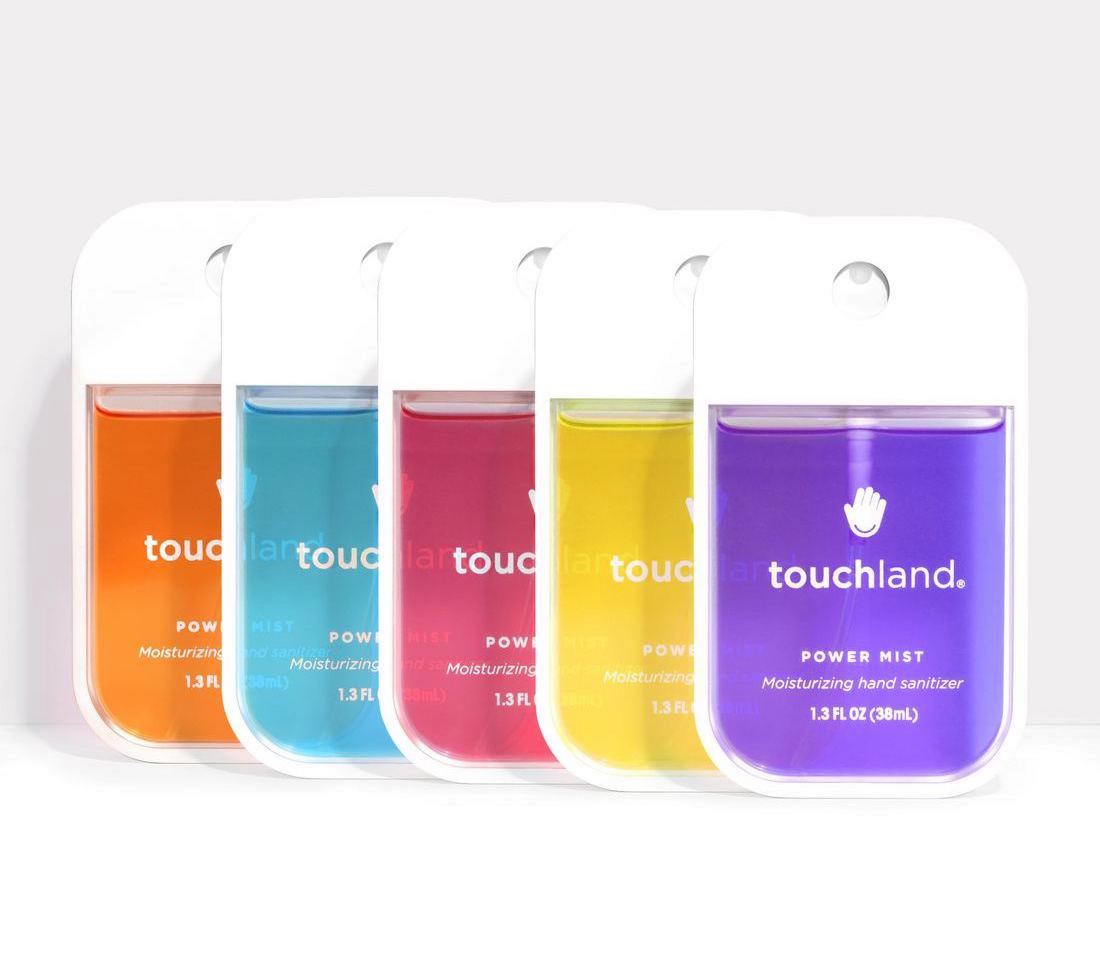
“We were already growing quickly when COVID began, then we completely sold out the first week of the pandemic. In three weeks, more than 34,000 customers were waitlisted on Touchland.com. We even did pre-orders to try and meet demand. Between March and May 2020, we had up to 700 orders per day and sold 10,000 dispensers to industry-leading brands in those three months.
COVID changed the mentality of hand sanitation for most businesses, and this won’t go away after the pandemic.”
Andrea Lisbona, Founder & CEO of Touchland
4. Children’s products
No matter if it’s diapers or new shoes for a rapidly growing toddler, children’s items will remain a necessity for consumers. Children have been deemed as “recession-resistant” because providing for their kids is always a priority for parents.
Take the Google Trends report from the US Great Recession in 2008. Despite an economic crisis, diapers remained a heavily searched item for consumers.
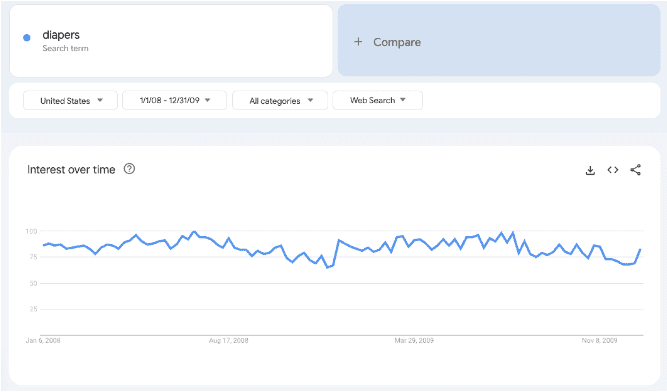
Experts have reported that some pricey items for children – including highchairs and bassinets – still sell well, suggesting that parents will pay top dollar for items that will last a long time and provide them with peace of mind.
In addition to products made for children, daycare and childcare services are recession-proof. During tough economic times, people have to work to provide for their families and need reliable childcare. That’s why childcare facilities and daycare providers will continue to stay in business during a recession.
5. Pet food and pet care
Even during times of inflation or a recession, pet owners are unwilling to compromise on high-quality food, supplies, and services for their dogs and cats. Sources have reported that consumers will spend more instead of sacrificing on quality or their favorite brand.
Products like food, supplements, treats, and other pet essentials are recession-proof because they’re necessary for consumers’ beloved four-legged friends. This is especially true for Americans who spend more on their pets than consumers in other countries.
Just like pet parents, PetLab Co., a leading pet supplement brand, wants the best for dogs. PetLab Co. is steadfast in their devotion to offering a quality product. They were looking for the same trait in a logistics partner.
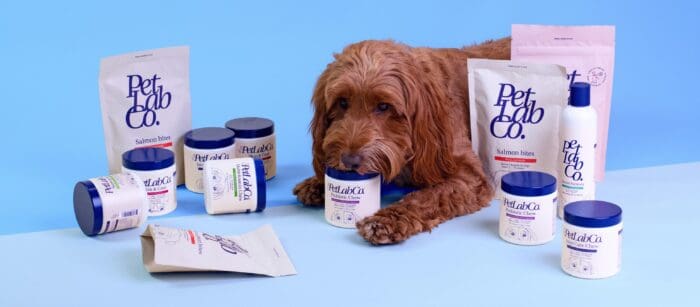
“If someone is going to treat your products like their own, that’s the most you can hope for in a fulfilment partner. ShipBob does exactly that. The customer experience and brand consistency is really important to us, so to receive that level of support from ShipBob means so much to us…Because we don’t operate our own warehouse and fulfilment centres, we need to trust a 3PL team that is going to be invested in delivering our products to the best of their ability.”
Stephanie Lee, COO at PetLab Co.
6. Discount retailers
When times are tough, people will try to save money where they can. So, it makes sense that when a recession hits, discount retailers become popular with consumers.
Walmart and Dollar General are retail giants known for their rollback prices and everyday savings. Ecommerce brands can leverage B2B partnerships with these types of retailers so they can appeal to a new audience.
ShipBob can fulfil retail distribution and dropshipping orders for over 100 retailers to help your brand reach new audiences and meet customers wherever they shop.
7. Home improvement and auto repair
During a recession, consumers will be focusing on fixing and repairing what they already have instead of buying something new. Instead of hiring a handyman or technician, homeowners and car owners may be keen to do DIY projects around the house to save money. That’s why home repair and auto repair products have lasting power throughout a recession.
With a difficult housing market and high interest rates, many homeowners would rather fix up the home they own, as opposed to buying a new house. Offering home improvement products like tools, hardware, paint supplies, electrical supplies, and home security systems would be a way to attract and retain customers during a recession. This way people can complete repairs and renovations without paying the price set by a contractor.
Additionally, gardening and home organisation products may become popular as people are spending more time at home and want hobbies that can spruce up their existing environment.
Similarly, offering auto repair products like windshield wipers, fluids, batteries, and other car care can sell during a recession. Brands like AutoGeek leverage ShipBob to help keep their shipping costs low as they continue to scale.
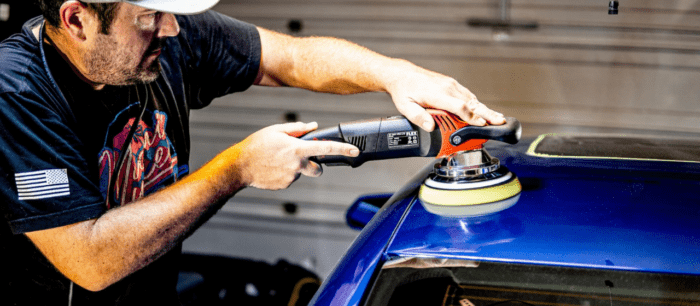
“The ability to have variable costs and competitive pricing for shipping is important to us. That’s ultimately why we chose ShipBob. Compared to fulfilling orders from our warehouses, our shipping costs have come down since partnering with ShipBob.
Plus, we know that ShipBob has over 50 fulfilment centres and plans to grow into more. Even though we aren’t ready to be in multiple fulfilment centres, we know it’s an option for when we are. As a mom-and-pop shop, if we’re going to compete with Amazon, we need to be able to get our products out to customers in 2 days. ”
John Lewis, President and COO of Vision Investments, parent company of AutoGeek
8. Freighting, fulfilment, and logistics
With our world being tightly interconnected, businesses and governments consistently rely on shipping and logistics to get essential products to those you need them. For instance, ShipBob’s fulfilment centre locations ramped up productivity when COVID brought on a boom in online shopping and brands needed help fulfilling their orders.
There is a lot more pressure on ecommerce business owners and operators to get orders delivered to customers on time, especially if selling a high-demand product. During difficult times, ecommerce brands need a reliable third-party logistics (3PL) partner to ensure customer orders are going out on time and they can offer reliable shipping and delivery services.
For instance, supplement brand EnduroSport partnered with ShipBob to launch their brand during the coronavirus pandemic and was able to start fulfilling orders quickly.

“They broke down all the fulfilment centre locations, gave transparent prices, and shared data points I needed to make a good decision. I didn’t receive this data from any other 3PLs. With ShipBob, I knew exactly what I was getting. Especially during the Coronavirus, this made a big difference.”
Tim Fink, Co-Founder of EnduroSport
8 recession-proof product types in 2024
As previously mentioned, there are many products that are considered “recession-proof” and continuously survive times of economic uncertainty.
Despite recent economic issues such as COVID-19 and high inflation, consumers are still shopping online. It’s expected that consumers will spend $11 trillion USD on goods and services in 2024.
Here are some recession-proof products that consumers are expected to spend their money on this year:
1. Beauty, hair, and skincare products
History has shown that even during major economic downturns, including The Great Depression, the sale of lipstick increases, known as the “lipstick effect.” Beauty products — which include everything from skin creams to hair products — have been hugely popular. ShipBob even found that hair care was a best-selling product during last year’s Cyber shopping weekend.
During a recession, more people may choose to cut and dye their hair, paint their nails, and maintain their skincare routine at home in order to bring the spa-like luxury into their homes instead of venturing out to salons to pay their premium prices.
Beauty brand, FlutterHabit, leverages ShipBob’s WMS in order to reach more customers around the globe.

“As a company that’s founded, co-owned, and run almost entirely by women, we are so excited to continue empowering women all across the globe, and keep connecting with all the people for whom we innovate.
In terms of growth, FlutterHabit is hitting the gas, so we need a system that can help us do it — and ShipBob has totally handled everything we’ve thrown at them.”
Bethany Peterson, COO of FlutterHabit
2. Nutrition products, meal replacements, and protein powders
When budgets are tight, people are likely to optimise their health and nutrition to get the best bang for their buck. Nutrition products like meal replacements and protein powders not only offer a healthy alternative but come with a longer shelf life than fresh produce. They also help consumers that may have specific dietary needs, such as plant-based, keto, low-fat, and/or low-sugar.
“We launched new bulk formats of our original, ketogenic, and plant-based formulas and have seen great customer response.
We will soon be launching the much-requested chocolate version of our Original and Ketogenic lines. ShipBob helps us offer these new flavour combinations to our customers with hardly any extra effort on our part.”
Connor Young, Founder & CEO of Ample Foods
3. Sports and fitness
When consumers are looking at where they can cut expenses, they may look to their pricey gym membership. As a result, people may look into at-home fitness equipment in order to exercise for less.
Unsurprisingly, fitness product sales exploded as a result of COVID-19 in 2020. Even as the pandemic has largely subsided, many people report that they still choose to workout at home. At-home fitness equipment is expected to grow at a CAGR of 5.2% and reach over $16 billion USD by 2030.
A a recent example, in response to COVID-19, fitness brand TB12 wanted to help their customers transition to work-from-home fitness with ease. The brand pivoted their fitness bundle offering to be an “At-Home” resistance band kit so people had everything they needed in order to exercise without access to a full gym.

4. Personal hygiene and home cleaning essentials
Cleanliness and health are important. From toothpaste and vacuums to laundry detergent and hand sanitizers, these types of consumer goods are used every day, and many people rely on them without even thinking about them. Plus, these essentials must be replaced over time. For these reasons, wellness and cleaning products are recession-proof
Ecommerce brands that offer home essentials make it easy for people to stay stocked while staying home through subscription orders. For instance, personal care brand Boie offers subscription plans for eco-friendly items such as toothbrushes, face scrubbers, and body scrubbers.
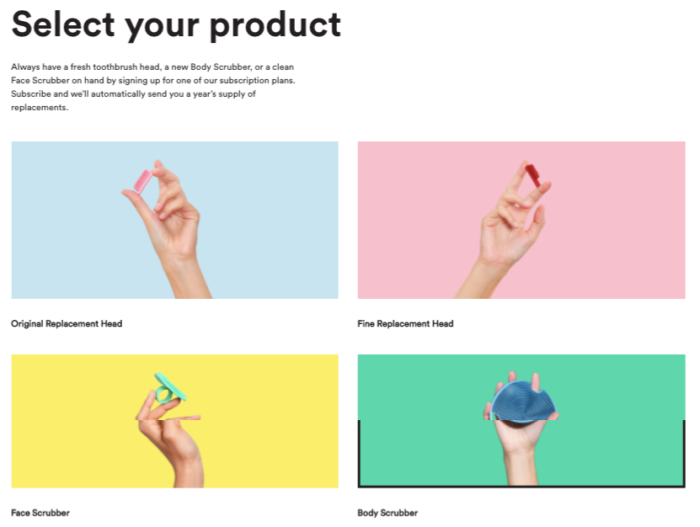
5. Inexpensive entertainment
As previously mentioned, inexpensive luxuries are popular among shoppers during times of economic hardships. When travel and leisure become too pricey, many consumers turn to cheap thrills to stay entertained.
Amid recent concerns about a recession, consumers have reported that they have shopped around for cheaper alternatives for their streaming platforms. However, many ultimately decided to keep their audio and video streaming services.
Traditional board games, puzzles, and books are experiencing an increase in sales as they provide a great, inexpensive way to entertain kids and families.
6. Pet care essentials
Much like human essentials, pet owners stock up on pet supplies so they can ensure their pets are taken care of. As a result, experts have called the pet care a recession-resistant industry. This is especially true as millennials and Gen Z are spending more on their pets than other generations.
Pet food, supplements, treats, and other pet care items are recession-proof because they are necessary purchases for pet owners. However, toys, apparel, and other ancillary pet items may not be as popular because they are deemed as “extra.”
7. Food and beverages
Grocery stores and food retailers have seen an enormous surge in sales since the pandemic several years ago. Online grocery shopping is increasing in popularity, especially in the United States. While it isn’t growing as steadily in areas like the United Kingdom (where online grocery shopping is growing at a CAGR of 5%), the industry is exploding in the US, where it is growing at a CAGR of over 17%.
Due to advances in ecommerce shipping and logistics, it’s easier than ever for customers to order food and drink products online that won’t spoil or get damaged during transit.
“When shipping glass bottles, especially in the winter, the longer the transit time, the more likely it is to break. We see that our customers are getting their packages safer, with fewer frozen bottles exploding.”
Lindsay Louise, Fulfilment & Retail Manager at Synchro
8. Diapers and baby products
With more babies being born and the internet making baby products easily accessible and deliverable, parents are buying items for their children online. Diapers, wipes, ointments, medicines, and other items are recession-proof because they’re necessities.
For example, diapers and other baby hygiene items are quickly used up and are necessary to have on hand. Diaper sales grew 154% during the pandemic and haven’t stalled since. Recurring online orders for diapers makes it easy for parents to get what they need to be delivered to their doorstep without having to place an order.
Business ideas for the future, even during a recession
There’s no telling how much of an economic downturn we’ll experience or when the next recession will be. Inflation has been rising in many parts of the world, and as a result, we may see fewer consumers reaching for their credit cards.
But if you’re worried about how a recession could impact your brand (whether you operate a business that offers recession-proof items or not), there are actions you can take to attract and keep customers. Adding cost-effective items to your store, creating discounted bundles, offering customer loyalty incentives, and giving customers alternative payment options like buy-now-pay-later can inspire customers to buy from your brand during a recession.
Seeing a surge in sales? ShipBob can help
The effects of a recession will always impact business and consumer behaviour across all industries to some degree. The COVID-19 pandemic marked a defining moment for the ecommerce industry. Although it forced many consumers to turn to online channels, many of them have continued to shop online knowing how easy it is to get the products they need delivered to their door.
Streamline your fulfilment with ShipBob’s advanced logistics
ShipBob’s fulfilment centres are powered by our proprietary technology, allowing you to streamline your entire fulfilment strategy from one dashboard. With best-in-class analytics and reporting, you can get a real-time look at your inventory, orders, and other important fulfilment data.
With information that can help you better distribute your inventory across our fulfilment network to real-time inventory counts, ShipBob’s technology provides you and your team with the data you need to know in order to make informed decisions.
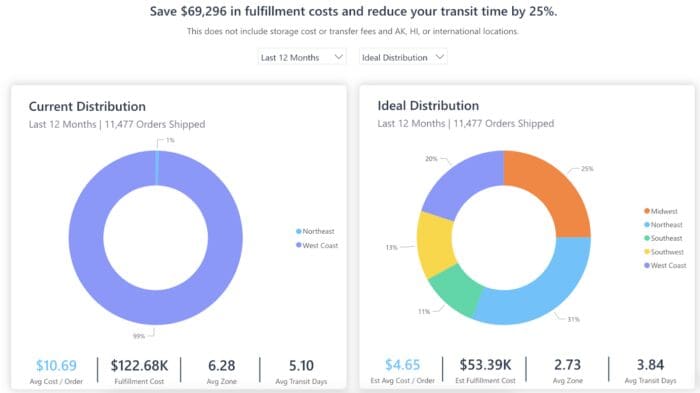
Maximise efficiency with our customisable warehousing options
Have your own warehouse space? Need a warehouse management system (WMS) that can help you streamline and optimise your warehouse operations? You can leverage ShipBob WMS to fulfil orders from your own facility. You can utilise the powerful technology we created for our fulfilment network in your own space to manage inventory, orders, and your warehouse.
Enhance customer satisfaction with reliable shipping services
No matter how you choose to fulfil your orders (outsourced to a partner or in-house at your own facility), ShipBob can help you unlock fast, efficient shipping. When you partner with ShipBob, you leverage our relationships with the leading couriers such as UPS, USPS, FedEx, DHL, and numerous regional couriers in order to offer fast, cost-effective shipping.
Additionally, you can use ShipBob’s 2-Day Express Shipping option to reach customers anywhere in the contiguous US in just 2 days – even from 1 ShipBob fulfilment centre.
Adapt quickly with ShipBob’s scalable ecommerce solutions
ShipBob helps thousands of brands of all sizes with outsourced DTC and B2B order fulfilment. Our global fulfilment network of over 50+ warehouses across the US, UK, EU, Canada, and Australia can help you reach customers no matter where they’re located.
With ShipBob, you can quickly enter new geographies, seamlessly connect with new retail partners, and trust that we can handle your growing order volume.
No matter what growing pains you may face, ShipBob can help you navigate them.
Get started with ShipBob
To speak with a fulfilment expert about fulfilling orders for your recession-proof business, request a quote below.
Recession-proof business FAQs
Here are answers to commonly asked questions about recession-proof businesses.
What are the best selling products during a recession?
Items like personal hygiene, household items, pet food, diapers, food and beverages, and cleaning products all sell well during an economic recession. These items are either used frequently or are required for consumers to live happy, healthy lives.
What industries are considered recession-proof?
There are several industries that are considered recession-proof or recession-resistant: food and beverage industries, pet care, baby and child care, cleaning products, and household goods. Small businesses can offer these if they want to offer products that will remain popular during times of economic hardship.
What are some examples of recession-proof industries or products?
Some of the most popular items businesses can offer during economic slumps are healthcare services and goods, pet care, baby and child care, food and beverage, and household goods like personal hygiene and cleaning products. All of these categories are considered recession-resistant businesses.
